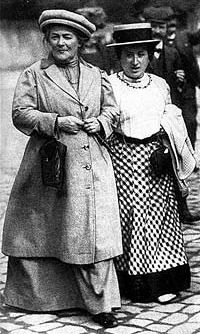Photo: Clara Zetkin (L) with Rosa Luxemborg in Berlin, c1910

8 March 2011 marked the hundredth anniversary of International Working Women’s Day, instigated by the Bolshevik Clara Zetkin and inspired by the protest in 1908 of 15,000 women workers through New York for better pay, shorter hours and the right to vote.
In oppressed nations through the world, hundreds of thousands of women, often braving batons and bullets, took to the streets to protest against war and occupation, poverty, inequality and violence against women.
But in Britain, despite the fact that working class women here are facing the most ferocious attack on living standards and equality seen for decades, the events organised to mark the day across the country seemed largely to consist of ‘rediscovering your original self’ with a day of pampering at London’s luxurious Sofitel St James (organised by Women Leading for Success); circle dancing in Hampshire ‘with a common theme of women’s struggle’; a candlelit celebration – with poetry, meditation and music – in a Mongolian yurt in Scotland; a day of Holistic Slimming Radio to ‘find your true beauty’ in London… and so on, an orgiastic, self-indulgent, navel-gazing, bourgeois celebration run by and for the women of the middle class who feel that their battle for equality has been won. There was little or no publicity for the genuine protests that did take place – the several thousand women who marched against violence against women in central London on 5 March, or the group who held a picket at Yarls’ Wood detention centre the following day in solidarity with the women asylum seekers inside.
Jobs and pay
In reality, for working class women in Britain, there is a whole new battle to fight. Even before the public sector cuts announced by the coalition government, women had not achieved wage parity with men: for full-time work the pay gap is 10.2%, rising to 19.8% for part-time workers. Women make up about two thirds of all low-paid workers, with 3.5 million women aged over 22 paid less than £7 an hour in 2010. Women also make up three fifths of all part-time workers, predominantly concentrated in low-skilled catering jobs, retail and customer services.
65% of public sector workers are women and, in particular, 53% of public sector jobs that will not be protected from cuts are held by women. This means that thousands of women are likely to lose their jobs in the coming period. Already, female unemployment, according to a TUC analysis, is at its highest level – 1,028,000 – since 1988. Women are also likely to feel the impact of cuts in hours or pay disproportionately because they already tend to work fewer hours and have lower wages than men.
Cuts in services
The Women’s Budget Group, an independent group of experts working with the Treasury to analyse the effect of economic policies on women, said that the Spending Review meant that lone parents and single pensioners – most of whom are women – would suffer the greatest reduction in their living standards to public sector cuts, with lone parents losing services worth 18.5% and female single pensioners services worth 12% of their incomes. Overall, single women will lose services worth 60% more than single men as proportions of their income. Women, as parents and carers – over a lifetime, seven out of ten women will be carers – in particular, will suffer the most from the loss of daycare centres for the elderly, children’s Surestart services and so on, and from the closure or reduction of sexual/reproductive health centres.
Benefits
The Women’s Budget Group also found that cuts in welfare spending also disproportionately affect women. Child benefit is paid almost 100% to women, while 53% of housing benefit claimants are women. Both have been cut significantly in real terms and eligibility has been tightened.
Other cuts include:
- The abolition of the Health in Pregnancy Grant, a universal payment worth £190;
- The abolition of the Baby Element of Tax Credits (worth a maximum £545 to eligible families)
- A cut in the proportion of childcare costs covered by Working Tax Credit, from 80% to 70% of costs.
Reductions to bus subsidies and increases in rail travel costs will, again, have a disproportionate effect on women who rely far more on public transport, particularly buses, than do men.
Equal before the law?
Rights for Women, part of the Justice for All alliance, has calculated that cuts to legal aid provision will affect working class women most and, in particular, victims of violence, disabled women, black and minority ethnic women and refugees and asylum seekers. More than twice as many women as men apply for legal aid. As Rights for Women points out:
‘As violence against women is both a cause and a consequence of women’s inequality, the ability to access free or low-cost legal advice is particularly important for women who are more likely to experience economic disadvantage and be less likely to be able to pay privately for legal advice’.
The point about violence is not negligible: in 2010, 101 women – just under two a week – were killed by a partner or a former partner and one in five women is thought to experience domestic violence at some point in her life.
FRFI has described the cuts announced by the government as a declaration of class war. Those who are most affected need to fight hardest. It is in all our interests to do so.
Cat Wiener




